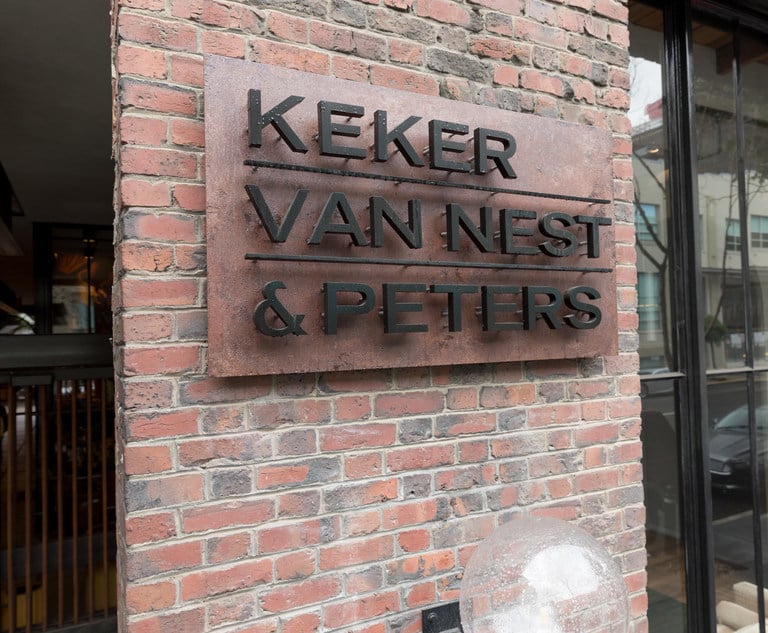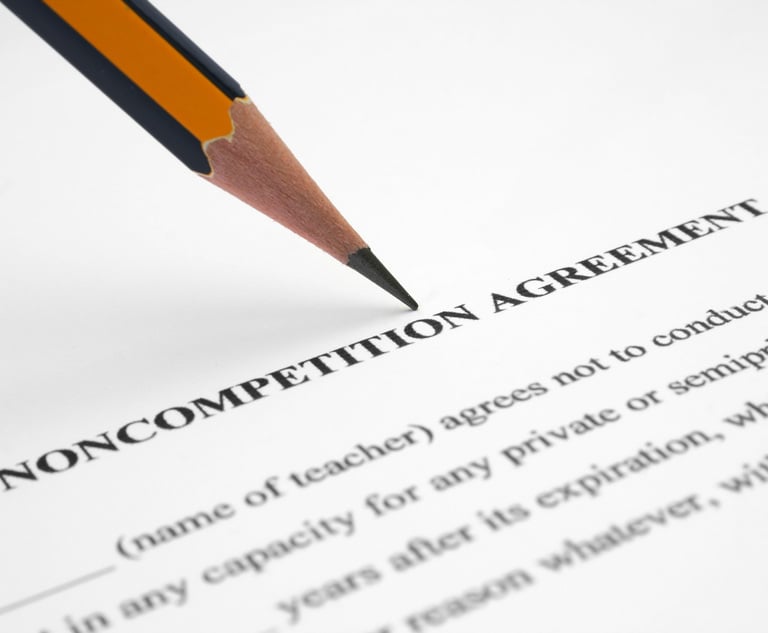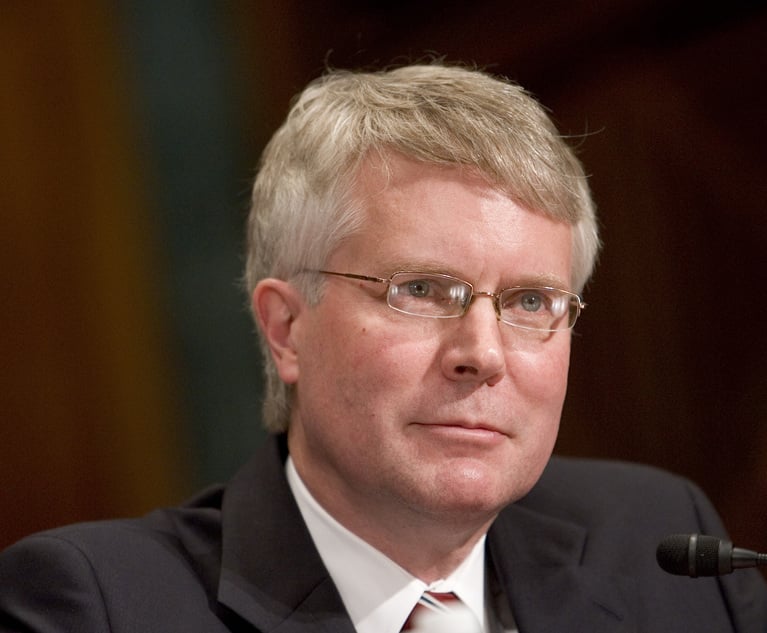Justices Pass Up False Claims Disputes, But More Cases Are in the Wings
The Supreme Court has picked up at least one False Claims Act case a term in recent years.
October 06, 2017 at 10:49 AM
5 minute read
 U.S. Supreme Court building in Washington, D.C.
U.S. Supreme Court building in Washington, D.C.
The U.S. Supreme Court this week turned away six False Claims Act challenges, but more disputes in the wings will try to capture the justices' interest in one of the U.S. government's most lucrative civil tools in the fight against fraud.
The six petitions in which the high court denied review ran the gamut of legal issues under the False Claims Act law, including pleading standards, statute of limitations, legal fees and knowledge requirements.
 John Elwood of Vinson & Elkins
John Elwood of Vinson & Elkins “It's hard to deny [the law] raises important issues,” said John Elwood, an appellate partner at Vinson & Elkins in Washington. “There are so many filings and it is a big source of recoveries for the federal government. Between the two of those, it does seem to be leading to a steady stream of litigation.”
The Justice Department obtained more than $4.7 billion in settlements and judgments from civil cases involving fraud and false claims against the government in fiscal year 2016 ending Sept. 30, according to a government report.
During the last decade, the Supreme Court has granted review in at least one False Claims Act case each term, said whistleblower litigator Joseph White, a partner at Nolan, Auerbach & White.
“There were a lot of circuit splits on very key issues and the solicitor general encouraged the justices to grant review,” he said. The False Claims Act was amended in 2009 to attempt to reconcile some of the circuit splits, he said. More recently, he said, the Justice Department has not urged the justices to grant any petitions. “But there are still a lot of circuit splits,” he added.
Some of the litigation represents fallout from the high court's decision last term in Universal Health Services v. United States, ex rel. Escobar. In that case, the justices confronted “implied false certification” theory for liability under the False Claims Act. That's when a defendant, submitting a claim to the government, makes a representation about the goods or services provided but fails to disclose noncompliance with material statutory, regulatory, or contractual requirements. White said there is “a lot of confusion” about the scope of the Supreme Court's ruling in Escobar.
One of two pending petitions at the Supreme Court—Triple Canopy Inc. v. United States ex rel. Badr—stems from the Escobar decision.
The government alleges Triple Canopy, which contracted to provide security services in Iraq, submitted false claims for payment for guards who did not meet the marksmanship skills required by the contract. The invoices billed only for “guards.” The U.S. Court of Appeals for the Fourth Circuit said in May the word “guard” on the invoices was a representation that the guards met the marksmanship requirements.
In the high court, Triple Canopy's lawyer, Tara Lee of Quinn Emanuel Urquhart & Sullivan, asked the justices: Does a government contractor's request for payment constitute an implied certification of compliance with all contractual provisions?
The second pending petition—United States ex rel. McGrath v. Microsemi Corp.—raises questions about materiality and knowledge requirements under the False Claims Act. The complaint alleged that Microsemi, a microelectronic manufacturer that is represented in the high court by Theodore Olson of Gibson, Dunn & Crutcher, and its subsidiary White Electronic Designs Corp, violated the False Claims Act by falsely certifying compliance with the International Traffic in Arms Regulations, which prohibit exporting controlled information without a license. The Ninth Circuit affirmed the dismissal of the complaint.
The fiscal year 2016 recoveries under the False Claims Act were the third highest annual recovery the law's history, bringing the fiscal year average to nearly $4 billion since fiscal year 2009, and the total recovery during that period to $31.3 billion. Sixty percent of those recoveries were obtained in the last eight years, according to the Justice department.
A handful of closely watched False Claims Act cases are pending in lower courts. The case United States ex rel. Campie v. Gilead Sciences in the Ninth Circuit raises a materiality issue. Gilead is represented by E. Joshua Rosenkranz of Orrick and Robert Long of Covington & Burling.
Three other cases confront the False Claims Act's first-to-file rule, a provision that benefits the initial complaint of fraud and blocks subsequent ones. The trio of cases questions whether a whistleblower can remedy a first-to-file violation by amending the complaint after an earlier filed case is dismissed: Shea v. Verizon (D.C. Circuit) ; United States ex rel. Carter v. Halliburton/KBR (Fourth Circuit); and Wood v. Allergan Inc. (Second Circuit).
Of the $4.7 billion recovered in fiscal 2016, $2.5 billion came from the healthcare industry, including drug companies, medical device manufacturers, hospitals and laboratories. The next largest recovery came from the financial industry in the wake of the housing and mortgage fraud crisis. Settlements and judgments in cases alleging false claims in connection with federally insured residential mortgages totaled nearly $1.7 billion in fiscal year 2016—the second highest annual recovery in this area.
This content has been archived. It is available through our partners, LexisNexis® and Bloomberg Law.
To view this content, please continue to their sites.
Not a Lexis Subscriber?
Subscribe Now
Not a Bloomberg Law Subscriber?
Subscribe Now
NOT FOR REPRINT
© 2024 ALM Global, LLC, All Rights Reserved. Request academic re-use from www.copyright.com. All other uses, submit a request to [email protected]. For more information visit Asset & Logo Licensing.
You Might Like
View All
Pac-12, Represented by Keker, Sues Mountain West Conference Over 'Unlawful' Poaching Penalty

California Federal Court Home to Highest Trade Secret Caseload in the Nation, Says New Report

Employers Should Narrowly Tailor Noncompetes to Pass Scrutiny, Say Trade-Secrets Attorneys
4 minute read
Courts Need Experts' Help in Analyzing Online Arbitration Clause Designs, Judge Says
Trending Stories
- 1Call for Nominations: Elite Trial Lawyers 2025
- 2Senate Judiciary Dems Release Report on Supreme Court Ethics
- 3Senate Confirms Last 2 of Biden's California Judicial Nominees
- 4Morrison & Foerster Doles Out Year-End and Special Bonuses, Raises Base Compensation for Associates
- 5Tom Girardi to Surrender to Federal Authorities on Jan. 7
Who Got The Work
Michael G. Bongiorno, Andrew Scott Dulberg and Elizabeth E. Driscoll from Wilmer Cutler Pickering Hale and Dorr have stepped in to represent Symbotic Inc., an A.I.-enabled technology platform that focuses on increasing supply chain efficiency, and other defendants in a pending shareholder derivative lawsuit. The case, filed Oct. 2 in Massachusetts District Court by the Brown Law Firm on behalf of Stephen Austen, accuses certain officers and directors of misleading investors in regard to Symbotic's potential for margin growth by failing to disclose that the company was not equipped to timely deploy its systems or manage expenses through project delays. The case, assigned to U.S. District Judge Nathaniel M. Gorton, is 1:24-cv-12522, Austen v. Cohen et al.
Who Got The Work
Edmund Polubinski and Marie Killmond of Davis Polk & Wardwell have entered appearances for data platform software development company MongoDB and other defendants in a pending shareholder derivative lawsuit. The action, filed Oct. 7 in New York Southern District Court by the Brown Law Firm, accuses the company's directors and/or officers of falsely expressing confidence in the company’s restructuring of its sales incentive plan and downplaying the severity of decreases in its upfront commitments. The case is 1:24-cv-07594, Roy v. Ittycheria et al.
Who Got The Work
Amy O. Bruchs and Kurt F. Ellison of Michael Best & Friedrich have entered appearances for Epic Systems Corp. in a pending employment discrimination lawsuit. The suit was filed Sept. 7 in Wisconsin Western District Court by Levine Eisberner LLC and Siri & Glimstad on behalf of a project manager who claims that he was wrongfully terminated after applying for a religious exemption to the defendant's COVID-19 vaccine mandate. The case, assigned to U.S. Magistrate Judge Anita Marie Boor, is 3:24-cv-00630, Secker, Nathan v. Epic Systems Corporation.
Who Got The Work
David X. Sullivan, Thomas J. Finn and Gregory A. Hall from McCarter & English have entered appearances for Sunrun Installation Services in a pending civil rights lawsuit. The complaint was filed Sept. 4 in Connecticut District Court by attorney Robert M. Berke on behalf of former employee George Edward Steins, who was arrested and charged with employing an unregistered home improvement salesperson. The complaint alleges that had Sunrun informed the Connecticut Department of Consumer Protection that the plaintiff's employment had ended in 2017 and that he no longer held Sunrun's home improvement contractor license, he would not have been hit with charges, which were dismissed in May 2024. The case, assigned to U.S. District Judge Jeffrey A. Meyer, is 3:24-cv-01423, Steins v. Sunrun, Inc. et al.
Who Got The Work
Greenberg Traurig shareholder Joshua L. Raskin has entered an appearance for boohoo.com UK Ltd. in a pending patent infringement lawsuit. The suit, filed Sept. 3 in Texas Eastern District Court by Rozier Hardt McDonough on behalf of Alto Dynamics, asserts five patents related to an online shopping platform. The case, assigned to U.S. District Judge Rodney Gilstrap, is 2:24-cv-00719, Alto Dynamics, LLC v. boohoo.com UK Limited.
Featured Firms
Law Offices of Gary Martin Hays & Associates, P.C.
(470) 294-1674
Law Offices of Mark E. Salomone
(857) 444-6468
Smith & Hassler
(713) 739-1250










